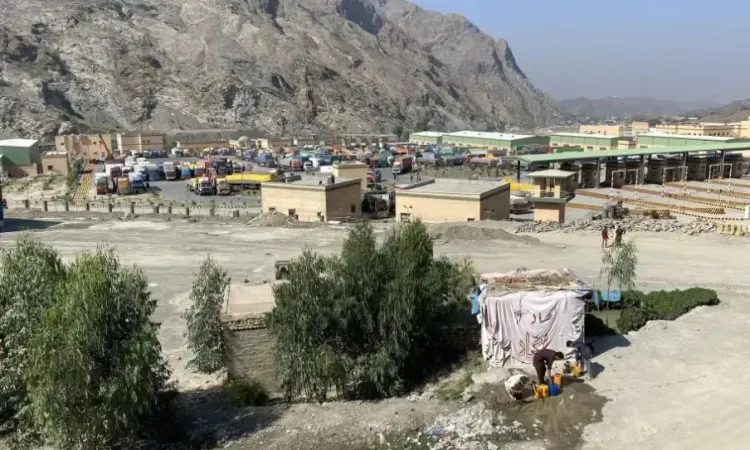What is Kabul's Response to Trade Challenges at the Pakistan Border?

Synopsis
Key Takeaways
- Trade disruptions at the Afghanistan-Pakistan border are causing significant economic losses.
- Dried fruits have emerged as Afghanistan's top export.
- The Taliban is actively seeking alternative trade routes.
- Recent sanctions on Iran have complicated trade logistics.
- The resilience of almonds highlights the importance of agriculture in local livelihoods.
New Delhi, Oct 27 (NationPress) The ongoing uncertainty at the Afghanistan-Pakistan border, triggered by intense exchanges of fire this month, coincides with reports showing a surge in Kabul's agricultural exports. Notably, dried fruits have become the most valuable export of the country in recent times.
This situation has compelled the Taliban administration to explore alternative trade routes, according to various reports. The President of the Afghanistan-Pakistan Joint Chamber of Commerce, Khan Jan Alokozai, informed Pajhwok Afghan News that both sides are incurring losses of approximately $1 million daily due to the closure of border crossings.
He mentioned that around 2,000 vehicles typically traverse the border posts each day, but all routes have been shut for the last two weeks. The primary contributors to the traders' losses are perishable goods such as fruits and vegetables.
The border's closure comes at a critical time when Afghanistan's agricultural exports are experiencing a rare upswing, with dried fruits like almonds, pistachios, raisins, dried apricots, and walnuts ranking among the country's top export products.
Kabul reports indicate that dried fruit shipments have amassed around $518 million over the past ten months. Tolo News cites the Herat Chamber of Commerce and Investment, indicating that dried fruit exports from the province have surged by over 130 percent this year.
According to the chamber's statistics, approximately 14,000 tonnes of dried fruits valued at nearly $40 million have been exported to various nations in the last six months, up from 8,000 tonnes worth $16.5 million during the same period last year.
Furthermore, the Herat Chamber of Agriculture and Livestock recently announced that several new international markets are expressing interest in Afghan dried fruits, which could significantly enhance export volumes.
Overall, Afghan dried fruits are experiencing high global demand, particularly those from Herat, which are regarded as superior by officials.
Crucially, almonds have shown resilience against water shortages and remain the sole crop that supports local livelihoods, despite recent droughts adversely impacting agriculture in Afghanistan's central province of Daikundi, as reported by Pajhwok News.
Almond trees are recognized for their drought tolerance and continue to thrive in parts of the province, serving as a vital income source for numerous families.
Afghanistan's semi-arid climate is characterized by hot, dry summers and cold winters, with limited wet spells in certain areas. The landlocked nation primarily relies on the Karachi and Gwadar ports in Pakistan, as well as Chabahar in Iran, for its trade.
Recently, the US reinstated sanctions on Tehran, terminating previous waivers, seemingly aiming to isolate Iran. This abrupt shift has created legal, banking, and insurance challenges for international firms operating at Chabahar.
In light of these challenges and the suspension of Afghan goods transit through Pakistan, the Ministry of Industry and Commerce of Afghanistan has pledged to establish alternative trade routes.
According to Tolo News, Minister of Industry and Commerce Nooruddin Azizi has outlined his department's initiative to support Afghan farmers, traders, and industrialists.
The Afghan news agency has reported that some Pakistani media outlets have quoted the country's Foreign Ministry as stating that trade transit with Kabul is currently suspended, and crossings will remain closed until the security situation is reassessed.
The Taliban leadership asserted that they undertook retaliatory actions at the Pakistan border on October 18, following airstrikes conducted by Pakistan in Paktika province and Kabul.
Normal trade operations can only resume after a substantial agreement is established between the two nations during the ongoing multi-round negotiations between their representatives.










